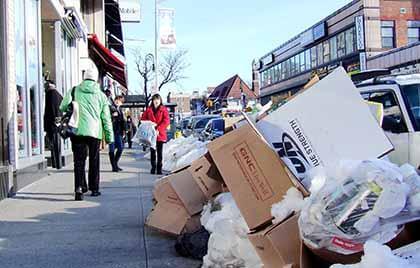By Joe Anuta
Austin Street, the upscale shopping strip of Forest Hills, is about to get trashy.
For the last 10 years, the Forest Hills Chamber of Commerce has hired an agency to do extra trash pickup and sweeping along the strip seven days a week. But due to a lack of funding, this practice may soon be scrapped.
“This year, with all the tough economic times, we do not have enough money to continue the service into the next couple of months,” said Leslie Brown, president of the chamber.
And the lack of extra manpower will affect the entire neighborhood, she said.
“It’s a whole community issue,” Brown said. “You want your neighborhood shopping area to be clean.”
She said people who get off the subway and Long Island Rail Road stops form an impression of the neighborhood, and if it is full of garbage, fewer people will want to come and shop, depriving the neighborhood of income.
The chamber of commerce usually hires workers from an agency called the Doe Fund to clean the streets. For $66,000 a year, two men empty garbage cans and sweep along Austin Street, Continental Avenue and parts of Queens Boulevard.
But the service benefits more than the pavement of Forest Hills.
The Doe Fund is a charity that rehabilitates New Yorkers suffering from homelessness and drug addiction or those who commit crimes by training and giving them jobs in communities throughout the five boroughs, Brown said.
“It’s not just cleaning the streets, it’s also helping men,” she said. “We’ve had several different men whose lives have been rescued.”
But make no mistake, cleaning the streets is part of the deal.
The workers from the Doe Fund pick up trash in addition to the city Sanitation Department, which Brown said does not do enough to keep the shopping corridor clean.
“We do not get adequate city sanitation to maintain these streets,” she said. “They do the bare minimum.”
For example, Brown said about seven years ago, the chamber did not secure workers from the Doe Fund to help with excess waste.
And the results stank.
“We saw the garbage overflowing on the corners, especially after a weekend,” she said. “It was smelly and at points in time we had rodent problems.”
Brown said the problem was particularly bad near the entrances to the 71st Street-Continental Avenue subway station and the Forest Hills stop of the LIRR.
And the stench of rotten garbage and rats do not make a neighborhood alluring for shoppers.
“It adversely affects business,” she said. “Shoppers are not going to want to come here if there are mice and garbage.”
As of the third week in January, Brown said the chamber is about $40,000 short of paying the bill. And she called on Austin Street businesses to pick up the remainder of the tab.
“They’re going to have to wake up and smell the coffee,” she said. “They’re going to get fined if there is garbage in front of their place.”
Brown said she realized economic times are tough, but if each business — and there are about 150 of them — paid $100 for the entire year, the chamber would have ample money for the program.
She also had a backup plan, possibly hiring the workers for weekends only. But regardless, the chamber will be holding a series of fund-raising events in the coming months to raise money and awareness in hopes of keeping Austin Street as squeaky clean as usual.
Reach reporter Joe Anuta by e-mail at januta@cnglocal.com or by phone at 718-260-4566.



































